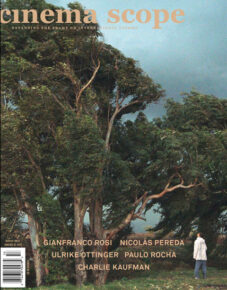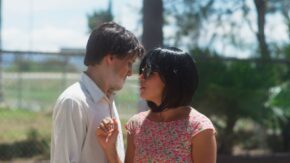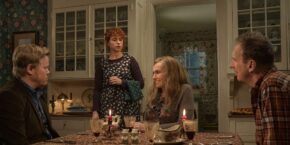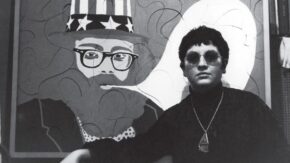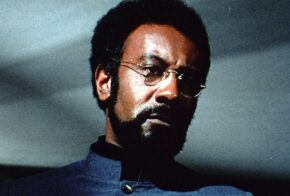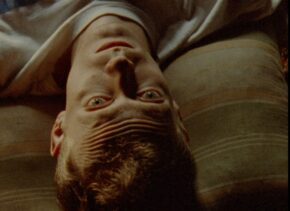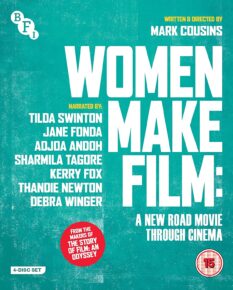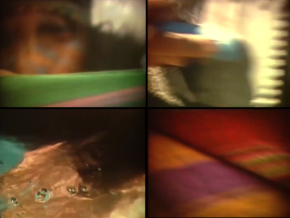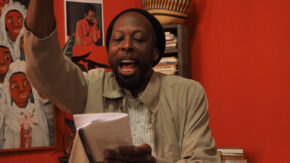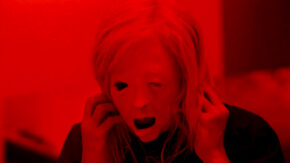CS84
Issue 84 Table of Contents
By Cinema Scope | 09/22/2020 | CS84, From Cinema Scope Magazine, Table of Contents
INTERVIEWS *The Act of Living: Gianfranco Rosi on Notturno By Mark Peranson *Reconstructing Violence: Nicolás Pereda on Fauna By Jordan Cronk FEATURES *A Pierce of the Action: On Claudine and UptightBy Andrew Tracy *I Lost It at the Movies: Charlie Kaufman’s Antkind and I’m Thinking of Ending ThingsBy Adam Nayman *Open Ticket: The Long, Strange…
Read More → The Act of Living: Gianfranco Rosi on Notturno
By Mark Peranson | 09/22/2020 | CS84, From Cinema Scope Magazine, Interviews
“The night scares me so much,” confesses a courageous Yazidi pre-teen girl to a therapist, remembering the period when she and her younger sister were captured by ISIS. Anyone who was seen crying would be killed, they were told; it turned out to be a vacant threat, but the sisters were still beaten, and now they are attempting to exorcise their memories by drawing pictures of them. Does it help? We never find out.
Read More → Reconstructing Violence: Nicolás Pereda on Fauna
By Jordan Cronk | 09/22/2020 | CS84, From Cinema Scope Magazine, Interviews
There’s a point in nearly every Nicolás Pereda film when the narrative is either reoriented or upended in some way. In the past this has occurred through bifurcations in story structure or via ruptures along a given film’s docufiction fault line. Pereda’s ninth feature, Fauna, extends this tradition, though its means of execution and conceptual ramifications represent something new for the 38-year-old Mexican-Canadian filmmaker.
Read More → I Lost It at the Movies: Charlie Kaufman’s Antkind and I’m Thinking of Ending Things
By Adam Nayman | 09/22/2020 | CS84, Features, From Cinema Scope Magazine
“It’s all planned, but it isn’t thought out,” wrote Pauline Kael in her review of A Woman Under the Influence (1974), a nifty bit of critical jiu-jitsu turning John Cassavetes’ much-theorized—and, during Kael’s reign at The New Yorker, much-derided—technique of spontaneous improvisation within a dramatic framework against him.
Read More → Open Ticket: The Long, Strange Trip of Ulrike Ottinger
By Michael Sicinski | 09/22/2020 | CS84, Features, From Cinema Scope Magazine
One of the most surprising things about Ulrike Ottinger’s new documentary Paris Calligrammes is how accessible it is. Some cinephiles may be familiar with Ottinger based on an 11-year period of mostly fictional productions that were adjacent to the New German Cinema but, for various reasons, were never entirely subsumed within that rubric. Others are quite possibly more aware of her later work in documentary, in particular her commitment to a radical form of experimental ethnographic cinema.
Read More → A Pierce of the Action: On Claudine and Uptight
By Andrew Tracy | 09/22/2020 | CS84, Features, From Cinema Scope Magazine
By Andrew Tracy In his Camera Lucida, Roland Barthes identified two elements at work in the act of viewing photographs. On one level was what he labelled the studium, which he defines as a sympathetic interest on the part of the viewer, “a kind of general, enthusiastic commitment, but without special acuity…To recognize the studium…
Read More → The Home and the World: Three Films by Ruchir Joshi
By Jesse Cumming | 09/22/2020 | CS84, Features, From Cinema Scope Magazine
In a recent article published in advance of the restoration and rerelease of his work, filmmaker and writer Ruchir Joshi detailed the context for creative Indian documentary in the late ’80s, just as he was developing his practice:
Independent documentary makers tended to attempt only two or three kinds of non-fiction films: Films commissioned by NGOs, “activist” films around a social or political issue about which the filmmaker felt passionately, and films to do with culture, usually traditional craft or performance.
Chums at Midnight: On Hopper/Welles
By Alex Ross Perry | 09/22/2020 | CS84, Features, From Cinema Scope Magazine
Presented as a “new” documentary of which Orson Welles is the credited director, Hopper/Welles is at once less and more than whatever would accurately befit that pithy description.
Read More → Issue 84 Editor’s Note
By Mark Peranson | 09/22/2020 | Columns, CS84, From Cinema Scope Magazine
As this strangest of years plods not-so-merrily along, so as well do we, much lighter in the pocketbook but with all the resilience of an army of Mulans. (I think that metaphor makes sense, as I cannot currently afford to pay $30 to see a Disney film on Disney+ on my Apple computer).
Read More → Books | Molto Bene: The Life and Deeds of a Selfless Egomaniac
By Celluloid Liberation Front | 09/22/2020 | Books, Columns, CS84, From Cinema Scope Magazine
Carmelo Bene always had very little to do with the provincial history of Italian cinema and its self-congratulatory antics. “Culturally I’m not Italian, but Arab,” he told Jean Narboni in an interview for Cahiers du cinéma in 1968, reclaiming his geo-historical lineage while simultaneously denying the existence of a national culture. Born in the “ethnic mayhem” of Otranto—“a most religious bordello, a centre of culture and tolerance to bring together Islamic, Jewish, Turkish, and Catholic confluences”—Bene dedicated his life to the manic deconstruction of any form of identity, including his own.
Read More → Global Discoveries on DVD | Presumptions & Biases
By Jonathan Rosenbaum | 09/22/2020 | Columns, CS84, DVD Reviews, From Cinema Scope Magazine
We already know from his imaginary conversations with his very own “Orson” in The Eyes of Orson Welles (2019) that the presumptions of Mark Cousins respect no natural boundaries apart from those of his own hubris.
Read More → Exploded View | Artificial Paradise
By Chuck Stephens | 09/22/2020 | Columns, CS84, Exploded View, From Cinema Scope Magazine
As I type this, it’s 2:00pm in northeast Los Angeles, middle of the afternoon: the sky is brown with smoke, air conditioners are walking off the job, and last night I could barely breathe. Yesterday, it was 113 degrees in parts of northeast LA; the mountains and forests around us are on fire. “Just another day in paradise,” as the most seasoned Angelenos have become all too accustomed to gritting their smiles and facetiously confessing.
Read More → The Inheritance (Ephraim Asili, US)
By James Lattimer | 09/22/2020 | CS84, Currency, From Cinema Scope Magazine
The role of past insights in (still) present-day struggles is at the heart of The Inheritance, a playful, erudite, and boundary-blurring examination of what performing Black theory, literature, music, and testimony in a contemporary Philadelphia commune might set in motion.
Read More → Possessor (Brandon Cronenberg, UK/Canada)
By Mallory Andrews | 09/22/2020 | Canadiana, CS84, Currency, From Cinema Scope Magazine
If it’s true that Brandon Cronenberg sought to cheekily poke fun at his father David’s needle-phobia in his first film (Antiviral, 2011), it feels like parts of Possessor might have been engineered specifically to make my skin crawl.
Read More → 
